- Home
- Steve Rasnic Tem
The Man on the Ceiling Page 8
The Man on the Ceiling Read online
Page 8
On this summer evening, Gabriella was drawing. Sunshine through the prism in the kitchen window made rainbows on her shoulder and sleek hair. Stronger than my strong desire to hold her— to breathe in her presence in my life, to absorb through my pores who she was and would be to me—was my resolve not to be a distraction.
She’d started with the big rough shape of a green heart—green, not red, an aberration from which I was eager to infer courage and creativity. Whether by design or lack thereof, she’d left plenty of space between its wobbly curves and point and the four edges of the paper.
I offered no comment, tried not to steal too many glances, not to put my own names on what she was doing. She had to be free to see for herself where the heart would lead.
But I couldn’t help passing closer to her than absolutely necessary on my dinner-making crisscrosses of the kitchen, couldn’t quite resist the desire to be at least a witness. This is one of the countless dilemmas of parenthood: when to stay out of their way, when to stand close by, whether it’s permissible to appropriate just a little for oneself.
Carrying a pan from the cabinet to the stove by way of the table, I glimpsed four appendages on the bottom of the heart, two on either side of the point, the purple pair on the left smaller than the brown pair on the right. Feet? I knew not to ask.
When I looked again, under cover of getting out the big cutting board I could have done without, she had drawn a fat blue wiggly line all the way around the outside edge of the paper and was starting around a second time. A frame, I thought, until I saw that it was attached to the heart down near the point. A tail? In some places it veered inward a little, and in others it left the paper altogether.
The meal was ready before my daughter was. Hoping the rest of the family wouldn’t complain too much about the delay, I put the food in covered serving dishes in a warm oven and busied myself loading the dishwasher which ran almost constantly in those days, sweeping the floor that always needed sweeping, adding to the endless grocery list. Lopsided yellow ovals appeared, one in each hump of the heart, and a spray of rainbow lines on either side of a big pink dot.
Then, abruptly, Gabriella put her crayons down. “Mommy,” she said, and the name for our relationship thrilled me. As it still does. “Mommy, look.”
Invited, I sat down beside her and took the drawing she pushed across the table toward me. “Wow,” I breathed. “Gabriella, this is beautiful.”
She nodded, gave me a quick hug, and squirmed down off the chair.
In an attempt to capture the moment—whose nature, like the nature of all moments, was fluid—I said quickly, “It’s a beautiful heart.”
She was already on her way out of the room to find her brother to play. I was about to tell her they had to come to dinner instead when she looked at me sharply and declared, “It’s a cat.” Because she was the artist, “cat” was its name.
I said, “A cat shaped like a heart. Or a heart shaped like a cat.” Because I was the viewer and therefore part of the act of creation, because reality occurs at the place where horizons fuse, those were its names, too.
Ever since we’ve known her, Gabriella has shown artistic talent and a personal vision of the world. Her father and I have done everything we could think of to nurture and support her. In point of fact, we’ve done more than she has; Gabriella’s artistic nature has become, in some distressing and fundamental way, more ours than hers.
When she was six, she won a children’s art contest, saw her painting displayed at a local store. As a teenager, she had a show of her odd and fascinating little sculptures, where half a dozen sold. Rather than encouraging her, these successes and our enthusiastic pride seemed to scare her. She hardly works with clay at all anymore, and her rare paintings tend to be cursory and tentative—though once in a while she’ll come up with something brilliant, that talent and vision of hers spurting out despite all her considerable efforts to keep them down.
One of the names Steve and I have had for Gabriella is “artist.” It has not turned out to be a name she has for herself.
I was making my late-night paternal rounds to check on the kids—those I could still check on, those I still might help—the children still alive and out of prison and not yet moved away. Or out among the crowds of children lining the sides of the road in my imagination.
I eased open the door to Joe’s room. Even before my eyes registered the empty pile of blankets, I could tell by the quality of the silence that he wasn’t in his bed.
Not so much ignoring as disregarding the anxiety that comes naturally since Anthony died, I stepped in and shut the door. Joe’s room smelled of the white cat who despises everybody but him, the young-guy piles of unwashed clothes, the chemicals from the photography hobby that gives him and the rest of us such pleasure but remains—well, undeveloped. Cool air and the city-night light seeped in from the wide-open street-side window, and for a moment I thought he’d run away.
But there he was, sitting in his window, one foot braced on the porch roof and the other dangling inside his room. If he knew I was there he didn’t acknowledge me, and I didn’t immediately announce my presence.
I wanted to say, “Be careful, just be careful.”
I wanted to say, “You’re not spying on people with those binoculars are you?” and, “Go to bed. It’s a school night.”
I wanted to say, “Tell me how the world is from where you sit.”
But more than anything else, I wanted to say, by not saying anything, “Go where you need to go, son. Do what you need to do. Use this house, this room, this window as your lighthouse. It’s home base. Venture out as far as you like—you can always come back here in the end.”
Not much given to talking about such things, Joe would, I knew, recoil from such verbosity. He’d laugh to hide his embarrassment, although he does permit a kiss on the cheek from his dad now and then. For myself, I was torn between the confusing obligations of fatherhood and the sense of a delicate magic surrounding moments such as these. I stood in the shadows and watched my son, his profile against the blue-black patch of sky, his wiry forearm languidly braced against the window frame. I assured myself that I was close enough to catch him if he fell (and isn’t it ridiculous, the power we believe we have to protect our children!), but otherwise I’d stay out of his way.
Melanie tells about the moment she understood that Joe was no longer a child. She says they were sitting on the living room couch talking about something serious in Joe’s life, and all of a sudden the realization came upon her fully-formed: Now I have a teenage son. Something about his posture, the shape of his face, the lines of his body—something she was certain had not been there the day or the moment before.
For me, it’s been gradual and incremental, as much a process of layering as of emergence. More than with any of our other children, in Joe I can see the child he had been still playing in his face, in his voice, climbing in and out of the spaces between his ribs. On this night, the adolescent perched in the window was clearly the six-year-old I’d first met and the young man he is today. Beyond that—the thirty-year-old, the eighty-year-old—I don’t dare but can’t help imagine, and they’re there, too, in the boy on the windowsill.
Up here in this thick-walled and foliage-wrapped house, we’re often unaware of what goes on in the neighborhood, especially at night. It’s usually trouble, so we’re just as glad to have slept through it, although the feeling of isolation and the false sense of peace can be disconcerting. Sometimes we find out the next morning or weeks later: Another fender bender at the corner. Cars vandalized up and down the street. The big Siberian elm at the other end of the alley split in two by lightning. A coyote strolling big as life along our decidedly urban sidewalk. The man on the ceiling swinging from one ceiling to the next to the next; the neighbors never say a thing about him because they don’t and don’t want to know each other anywhere near that well. When Joe was younger he was most often the one to bring us the news, for Joe knew everybody and they trust
ed him enough to tell him things, but if they ever mentioned some fear they might have, some emotional difficulty, he didn’t pass that information along to us, for Joe has never been one to talk about such things.
The drama unfolding outside and below my son’s room was well within my field of vision. No doubt Joe was seeing it better than I was, though, since he had the binoculars. I wondered what the old man who is the watchman of the neighborhood, walking the block several times a day to see what’s going on, would have to say about this in the morning.
Joe swung his other leg over the windowsill (be careful!) so he could look straight down on the scene below. Now his back was to me. I couldn’t tell if he knew I was there, and I decided, for no good reason, that it was up to him to notice and acknowledge my presence, not up to me to announce myself.
In our front yard stood three adults, one I thought I recognized and two I’d never seen before, and two children who were intimate strangers to me. The boy, who looked to be about six, was telling everybody what to do. “Gabby,” he directed the little girl, “you go stand there.”
She said his name in that round two-syllable protest exactly like the first time we heard her on the phone, but she did what he said. In those days she pretty much always did what he said. That didn’t last.
To the woman with the stocking cap and bad teeth, the boy commanded, “You sit there.” When she didn’t move fast enough to suit him, he balled his fists and stomped his feet and repeated the instructions more imperiously, and he added a name that shocked me, though I supposed it shouldn’t. “Mom! What did I say? You sit there, right this minute!”
Laughing self-consciously, tears in her eyes, she went and sat on the couch where he was pointing. The small boy stood still for about ten seconds, which was as long as he ever stood still, then turned his skipping, jumping attention to the man who in body type looked so much like him and in face not at all. My throat tightened. “Dad,” said the little boy outside, and I put my hand on the shoulder of the teenager who was my son even though the child had not been, and my son Joe gave my hand a quick, surreptitious pat. “Dad,” said the child to the man with the knife, “you sit there.”
“Who you think you are, boy, tellin’ me what to do?”
The man advanced on the boy, and I stepped forward into the window. As if I could do something about what was happening, what had happened many years before. Nobody in the scene below looked up. Nobody, including the boy, knew yet that we were there. They would, though.
The child planted his feet in a cocky fighting stance and crossed his arms over his small chest. “Sit by her,” he ordered. “You have to sit by her.”
“What? Why should I do that?”
“Because I said so.”
Still the man didn’t obey, and I held my breath to see what this brave boy who would soon be my son would do next. There was a long, tense, showdown sort of pause.
Then, still brandishing his knife, the man swore and strode across the grass-and-gravel space meant to suggest a visiting room, a one-way observation mirror no doubt hidden behind the vine, and slouched onto the couch not exactly beside his wife but on the same piece of furniture.
The child was wound very tight. In him I could see the hours-long rages that would erupt from Joe after he became our son, when he would flail and sob and scream, blacken Melanie’s eye not out of any meanness but because the fury had to go somewhere, and we held on held on held on and assured him again and again that he wasn’t going anywhere and we weren’t going anywhere and we would get through this together because that’s what families were for.
The boy was yelling now. “Hold hands!”
The other woman in the room, the social worker, shook her head and smiled sadly. “The Little General,” she murmured, the name Joe had earned around the agency. And it wasn’t a name that would have embarrassed him, because it was, quite simply, the name for what he needed to be. For years he would wear a variety of “army” pants and camouflage gear, embarrassing his sisters who didn’t want to be seen with him. But he had no self-consciousness about it. I envied him, my son.
The man and the woman had made no move to touch each other. “I said hold hands!” the child shrieked, and threw something at them, a handful of something, dirt or gravel. They looked at each other and at the social worker, who nodded. They grasped each other’s hands, but it looked more like a gesture of aggression than a caress.
“Okay!” the boy shouted, beside himself now, jumping up and down and kicking the furniture and throwing everything he could get his hands on. “Okay, okay, okay! Now, you tell us good-bye!”
The process of separating children from adults who are capable of giving life but not of nurturing it often involves a goodbye visit during which they admit to some of their errors and give the children permission to go on with their lives. Its formal structure is designed to protect the child’s often raw emotions. For the adults it’s a final chance “to do the right thing” by their children. For the children—well, I can’t pretend to know what my children, all five of my children, must have felt at such an odd sort of ceremony. And watching this tableau on our front lawn didn’t help me. All I could see was that this little boy was the clearest, the most self-assured person in the room. I was amazed. I would have been terrified.
I didn’t know what to say to him about that time in his life that he didn’t, clearly, already know. At the end I kissed him on the cheek and, like generations of southern men before, called my son “honey,” and that kiss and that name are things I still give Joe today, and they are gifts the grown-up, highly reticent Joe still accepts.
Shape-shifters and dreamers and singers of songs. Sometimes we are cats. Sometimes we are hearts. How strange it is to dream of childhood and wake up an adult, to realize the names that populate our consciousness now—including our own—will one day be names from the past.
How strange it is to be someone in the mind and someone else in the mirror. If we could just imagine that other self well enough, our physical form might change forever. If we changed the furniture would we be different people? What if we moved to another city? What if we shaved, lost weight, ate our vegetables, drank more coffee, took up golf?
In the narrow space between first word and complex sentences, our oldest granddaughter Christiana invented a game. “Grandma Melanie,” she’d insist, which was a lot to say for someone just learning the multiplicity of the language.
Christiana has more grandmas and great-grandmas than the average child. At least one of them has abandoned her, perhaps two. Out of the common human impulse to name the order of the world—even when the order is painful, even when it is false—she said to me once, “I guess that’s what grandmas do. They go away.” I protested vehemently, took her face in my hands, pointed out that I’m still here.
I did not promise, have never promised anybody, that I won’t ever leave her, because, of course, one way or another I will: either I will die first or she will. Now that she’s older, Christiana thinks about that, too. But in the meantime, it’s important that she differentiate one grandma from another.
“Grandma Melanie. Say the pictures.”
With her in my arms I’d make my way slowly along the upstairs hallway where family photos are displayed. “That’s you when you were a baby,” I’d tell her. “That’s your daddy when he was little. That’s your cousin Katy.”
“That’s my cousin Katy. One time she ate a bee.”
“That’s your Uncle Anthony.”
“He died, huh?”
“That’s right. And here’s your great-grandma, my mom. She died, too, before you were born.”
Concepts like “died” and “before you were born” are hard for a two-year-old to grasp, but Christiana kept going into the mystery, naming her characters. “Grandma Melanie, say the pictures.”
“That’s me with my best friend when we were in high school.”
“That’s Aunty Gabby, huh? That’s Uncle Joe, huh? That’s you, huh? T
hat’s me.”
Saying the pictures. Giving her characters names and stories, and herself a place among them, a place in the gallery of our house.
When we gave the man on the ceiling a name we took a first step toward controlling the influence he had over our lives. Knowing the power of names, writers will sometimes spend months searching for the right name for a character so they can properly tell that character’s story. As writers, Steve and I sometimes are able to root out our own personal demons, chase them down, and pin names to their backs. If the name fits well enough you can almost see the demon diminishing before your very eyes: Rumpelstiltskins struggling and withering where they’ve been fixed inside the display case of story.
During the last summer of his life, my father said a car waited in the woods for him, covered by underbrush, camouflaged by trees.
Can’t you just see it? A humped shape that could be anything, but is, specifically, a car waiting specifically for him. He’d see the car, if seeing is what it was, and his slipping gaze would light on it. His face would light up.
But by then his fear had come to feel to me like curiosity, and maybe I didn’t understand that he was afraid. Or maybe he was, in fact, curious.
That last fall, my father said he had one foot in another world already. And smiled. But maybe by then the rage he’d promised (“If I ever get senile, I’ll shoot myself.”) had disguised itself as serenity, and I didn’t understand how angry he was. Or maybe he was serene.
My father forgot my name but still knew I was his daughter. Then he forgot I was his child and that he’d even had a child, but still knew I was someone important. Then he didn’t know I was there at all. But, for the first time since he’d been seven years old and his mother had died and they’d said don’t cry you’re a man don’t cry and he hadn’t, he spoke—repeated, perseverated, because he’d forget he’d just said it, and every time it gave him such new pleasure—he spoke of love. Of love, flat-out, no codes or disguises, naming it.

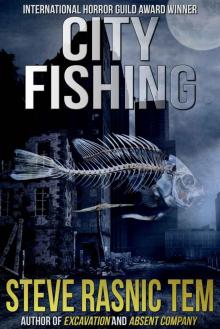 City Fishing
City Fishing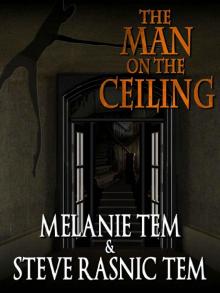 The Man on the Ceiling
The Man on the Ceiling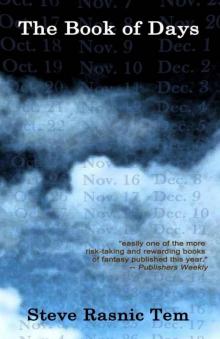 The Book of Days
The Book of Days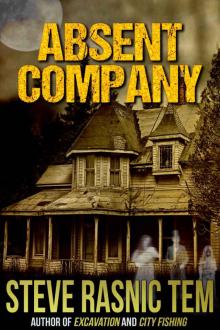 Absent Company
Absent Company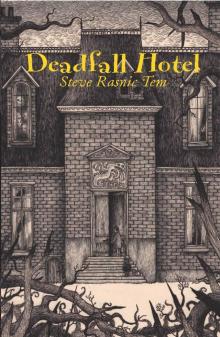 Deadfall Hotel
Deadfall Hotel Celestial Inventories
Celestial Inventories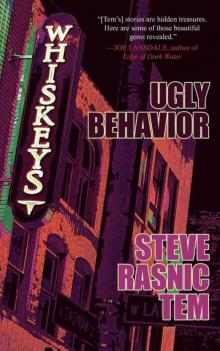 Ugly Behavior
Ugly Behavior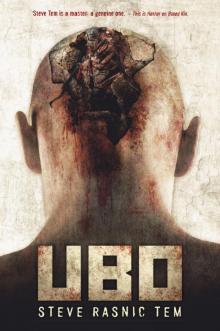 Ubo
Ubo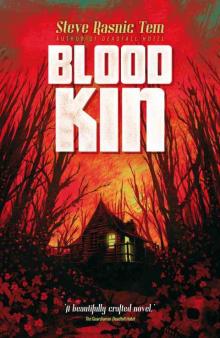 Blood Kin
Blood Kin